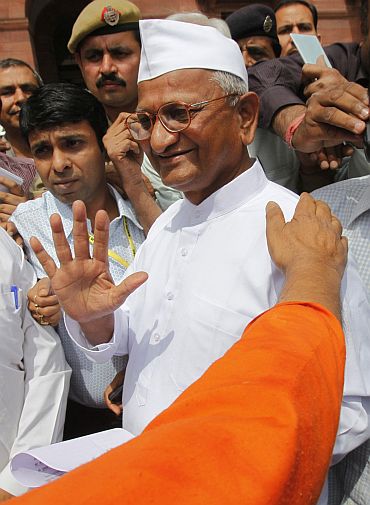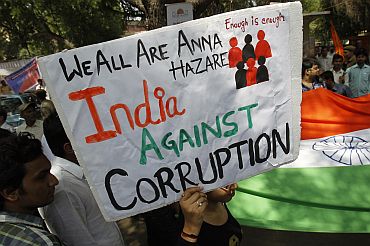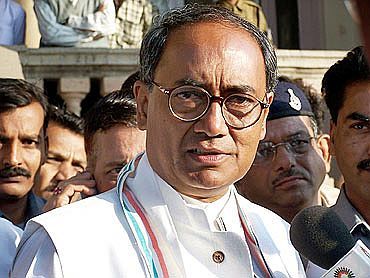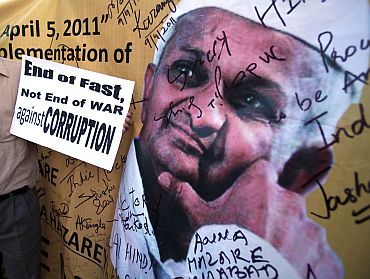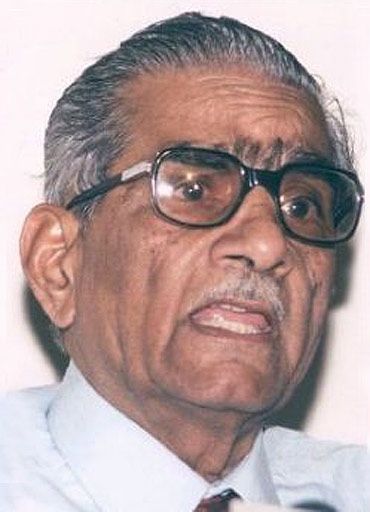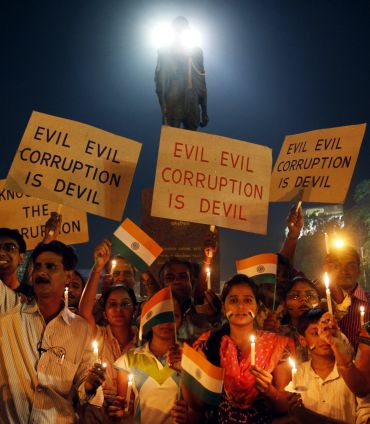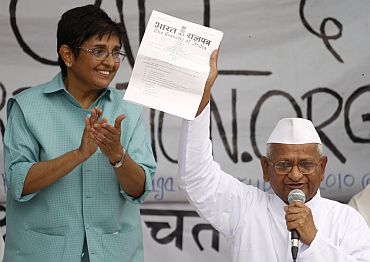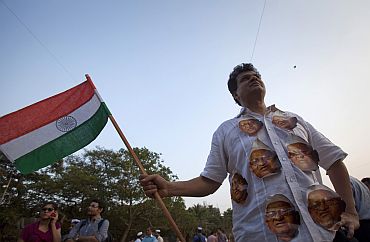 | « Back to article | Print this article |
Why THEY won't let Hazare's campaign succeed
Sheela Bhatt analyses the aftermath of the Anna Hazare fast in New Delhi and says that war has broken out at multiple levels over the Lokpal bill.
Prime Minister Manmohan Singh, while returning from Kazakhstan's capital Astana to New Delhi, was asked, "In the last few months, you have come under lot of attack from civil society. How much has the last few months disturbed you personally?"
He responded, "Well I am not disturbed but I have always believed when winter comes, can spring be far behind!"
It seems Dr Singh is unrealistically hopeful.
It can be safely said that neither the ongoing summer nor the monsoons that follow are likely to bring the bounce of spring to his government. To size-up prime minister's hopes, just watch how this government is reacting to the Anna Hazare phenomenon.
The war has broken out at multiple levels over the Lokpal issue.
Please click NEXT to read further...
Government's defence: 'You are not a lily white'
The smear campaign
There is a systemic campaign to discredit people belonging to the India Against Corruption. Their critics think that Hazare and his associates are out to 'undermine democratic institutions' by bringing in the Lokpal through legal process with highly 'centralised power' and without taking into account the 'plurality of voices'.
The government, the Congress party, a large numbers of NGO leaders, sections of the media, and secular people known for their stand against communalism seem to be on one page to oppose the Bhushans-Kejriwal-Hazare's version of the Lokpal bill in their own variety of ways and for a variety of reasons.
This forms a formidable force. And, many of them have power, people's backing and resources. Importantly, people against Hazare's movement, including the Congress party and the government, have some valid arguments.
They are pitting street power (Hazare/mobcracy) versus democratic institutions (elected representatives of people/structured democracy) in the debate. The issue of the Lokpal bill has reached the point where both sides have some solid logic to back their claim.
Right now, the Hazare-led group is looking vulnerable if not weak because Shanti Bhushan and Prashant Bhushan, both members as civil society representatives in the joint committee that will be drafting the Lokpal bill, are under scrutiny for their Rs 150 crore plus assets, mainly prime land that they have in Uttar Pradesh.
Unfortunately, they are on the defensive and the movement that started with Hazare fast at Jantar Mantar is entering a critical phase, too early.
The political critics of the Hazare movement have a simple argument: "He that is without sin, cast the first stone." 'Don't call me corrupt because you are not lily white' -- is the defence of the government, which is facing the people's ire.
Suddenly 'middle-class hypocrisy' is targeted and even a highly-credible magazine went to an extent to ask, "Do we, the Indian middle-class, see the corruption within us?" The ruling elite of New Delhi, which is under attack, can't ask for better advocate to defend their turf in such trying times.
'If Hazare gets his bill, BJP/RSS would be benefitted'
The RSS factor
A powerful section in the Congress party has not an iota of doubt that Hazare and his associates are backed by elements of the Rashtriya Swayamsevak Sangh.
So, saffron phobia of the government and the Congress would dictate their strategy on the Lokpal bill. The middle-class's outburst of April 5-8 can wait but the RSS can't be allowed to win by proxy, goes the argument of secular activists.
Of course, the Congress has been delighted to see that yoga guru Baba Ramdev, who was heading the active campaign against corruption since the last three years has been sidelined by the spectacular rise of Anna Hazare. "Baba ki dukan bandh ho gayi" as they say in New Delhi.
The event at Jantar Mantar succeeded, mainly, because it was perceived as an apolitical outburst.
Now if the saffron element is highlighted behind Hazare then the potency of anti-corruption campaign will fizzle out.
The Congress seems to be a divided house. It's believed that Union Finance Minister Pranab Mukherjee and Union Water Resources Minister Salman Khurshid are for giving a fair trial to Hazare's propositions while party general secretary Digvijay Singh, Sonia Gandhi's political secretary Ahmed Patel and Telecom Minister Kapil Sibal think that the event at Jantar Mantar was clearly backed by elements from the RSS.
If Hazare gets the bill that he wants, then eventually the beneficiary would be the Bharatiya Janata Party, they say.
This trio may not be entirely wrong. Many intellectuals are, also, giving the example of Jaiprakash Narayan's movement against Indira Gandhi when by backing JP's movement, the RSS got a lot of traction.
It is highly unlikely that the Congress would facilitate Hazare to realise his dream. The only tangle in diffusing the crusade is that he is not a 'purchasable commodity' nor is it easy to taint him.
But he can be isolated. That process is on. The process has just begun with Digvijay Singh talking about the issues that can gain circulation.
Nobody can predict if Anna Hazare will manage to sustain the support from the same middle-class that stood up for him on April 5-8.
It's politics of not letting credit slip away to Hazare
Politics is all about taking credit
The major political war over the Lokpal bill is about appropriating credit for it.
From an eight-year-old child to an eighty-year-old, the Indian middle-class saw the Hazare phenomenon on television. The running sentiment in the nation for four days was against corruption.
But, the response of the Congress and the government to the issues raised by Hazare is Digivijay Singh and Amar Singh! When middle class India, however hypocrite they may be, gave resounding support to Hazare's fast-unto-death, the government should have humbly accepted the fact that the middle-class is reacting to 'the rotten system' that Congress general secretary Rahul Gandhi is talking about.
Instead, the Congress and the government are adopting corrupt political practices, brazen methods and smear campaigns to target individuals. Obviously, it's politics of not letting credit slip away to 'Modi-Nitish Kumar fan' Hazare.
However, one thing worth noting is that Hazare has managed to appeal to the young people in spite of his old conservative ways of teaching his ideals. One can see in his native village his authoritarian streak in making masses understand the virtues of good social habits but young urban hearts are able to see the bigger virtues in him.
That is so, may be, because here is an old man not out to make money nor he is looking for position. Rather, it's an interesting contrast that a man in a white dhoti-and -topi is ruling the social media world these days.
Precisely this is hurting many established leaders of non-government organisations who have lost the opportunity to get 'credit' for important Lokpal bill to fight corruption.
They are bringing up the issue of 'centralised framework of the draft'; and giving scores of nuanced arguments to counter Hazare's campaign.
These well-established NGO leaders have patience to fight a long battle. They are finding fault with the Jan Lokpal bill 2.2 version which the government will not be in a position to ignore.
Bhushans' CD likely to haunt the government
Their hidden concern is also the hidden RSS hand at the event at Jantar Mantar.
It is true that the Akhil Bharatiya Vidyarthi Parishad and the local RSS people sent a few hundred foot-soldiers to Jantar Mantar. But Hazare is not an 'RSS man'.
He is a loner believing in himself, rigidly. The true RSS man is normally not individualistic like Hazare is.
Baba Ramdev with his saffron clothes and saffron thinking against corruption is much closer to the RSS agenda. In fact people who know Hazare say that the RSS factor in Hazare's life is limited to the support he extended to the Marathi-speaking RSS activists, 25 years back, in his rural development programme.
There are a network of rural-based trusts in Maharashtra that are interlinked to the RSS where Hazare was lending inspiration through his development related work.
Hazare, in one of his interactions in New Delhi, refused to condemn the RSS unequivocally, but he instantly disengaged himself from the RSS by saying, "I don't support any agenda that divides country.'
The arrival of a doubtful CD just before the first meeting of joint committee has exposed government's thinking over the broader issue of the Lokpal bill.
The CD that has come out involving lawyer Shanti Bhushan and his son Prashant Bhushan is likely to haunt this government.
Already, the rumour capital of India has begun naming a crony of Amar Singh, as the man who may have doctored the tape. On Sunday, a senior minister in government even called a couple of editors to plead with them not to highlight Prashant Bhushan's version.
He questioned Bhushan's claim that the CD containing his father Shanti Bhushan's voice is fake. The Delhi police are investigating the case.
But, the Hazare camp is arguing that let everyone interested in accountability of government servants focus solely on the Lokpal bill.
The 'awkward' jugalbandi of Hazare and Bhushan
The entire political spectrum is upset
The CD is a side show but the bigger political story than Bhushan's credibility is what Kapil Sibal, a member of drafting committee of Lokpal bill and Digvijay Singh, most powerful spokesman of Congress party, are talking.
If you read between the lines from Singh's utterances against Hazare and his associates, he is making it clear that the Congress is unlikely to allow Hazare get the credit of gifting the Lokpal bill to Indian democracy.
Congress knows too well how the credit of Right to Information bill and the National Rural Employment Guarantee act have brought them back to power.
But, why blame only the Congress?
Many chief ministers and senior leaders of non-Congress parties are, also, not backing Hazare. Most politicians are irritated, amused or disgusted by the middle-class show of support to Hazare, but not impressed. Their argument is that in states where the Lokayukta has been instituted, corruption is not under control nor is the institution of Lokayukta made robust enough.
In one state, even the Lokayukta has been found to be tainted. It is becoming clearer that the entire political class would like to wait for Hazare to lose steam.
The Bhartiya Janata Party, the biggest opposition party has serious regret that they have not been invited to join the joint committee. They are wisely keeping silent while the Congress bears the brunt of the whole issue.
It's understandable why no government including the one led by Atal Bihari Vajpayee wanted the Lokpal bill.
Nobody likes to share power or dilute power that they have. After all, Hazare wants the Central Bureau of Investigation and office of Central Vigilance Commissioner to come under the Lokpal, overnight.
The most ironical part of April 5 hunger strike is that the Congress sees the RSS hand behind Hazare, while the BJP sees 'jholawalas' and Maoist sympathisers behind Prashant Bhushan and Arvind Kejriwal.
However, the BJP leaders are not defaming the Bhushans as much as the Congress because of Prashant Bhushan's successful legal activism in nailing jailed former telecom minister A Raja and pursuing many cases against the UPA government without compromising.
The Hazare group is 'weird' in that sense for many critics because hundreds of liberal and ultra-left activists who have been supportive of Prashant Bhushan are doubtful of the people behind Hazare.
This awkward jugalbandi of Hazare and Bhushan is creating confusion due to animosity amongst people who support them in the background.
Is Hazare asking for the moon?
The most important clause in the bill is selection, rejection and accountability of the Lokpal. The government and Hazare's side may see a breakdown of talks over it. It will require sagacity of the highest order to prepare the final draft of the Lokpal bill by the joint committee. So far, no such signs are visible on the government side.
Hazare told rediff.com that he wants a "proper independent investigating agency" to function under the Lokpal. That is the most important agenda of the new bill.
The vested interests are spreading a canard that the Lokpal will also adjudicate cases of corruption. Hazare has said many times that it's not true. After fair investigation of corruption cases against bureaucrats or ministers, it would move to regular courts.
In India invariably many high-profile corruption cases are weakened or made messier at the investigation level. It's expected that the judicial process in a corruption case would move faster than today if the Lokpal's institution handles it.
The latest draft of Hazare's group wants complete transparency in selection of the Lokpal. Two, they want the Lokpal to have complete independence from governmental interference. Three, they want a completely independent police force to investigate corruption in government.
Amongst many things that they want is for enough funds over which government should not have any maneuvering power.
The government understands that if before August 15, such a bill is passed what electrifying impact it will have on real politics. Even though the Lokpal bill won't serve the larger issues of corruption in government because it's not a preventive measure, it will change the way people in power behave.
Hazare and Kejriwal have repeated many times that they want the Lokpal to be accountable and enough steps are in the proposed draft to make the Lokpal accountable.
The complaint against the Lokpal can be filed in the Supreme Court and the apex court will have to form a three-judge bench to look into the allegations.
Let's talk about Lokpal bill, please
It is very sad to see that civil society's most respected members like Aruna Roy, Nikhil De and many others have raised too many apprehensions against Hazare's method and proposed draft.
In their column on Lokpal bill and Anna's fast, Roy and De have said in Outlook magazine, "A Dalit leader, talking on corruption in Jaipur a few days ago, commented that the middle-class, which assists the giving and taking of bribes, is doing its 'prayaschit' at Jantar Mantar with havans and bhajans. The disquiet about markedly Hindutva symbols and associates of the campaign has turned into deep suspicion following Hazare's praise for the Narendra Modi development model. It seems to symbolise an alignment of corporate power with a kind of majoritarianism and religiosity and a natural disdain for dissent."
The differences between Roy and Hazare are no less than the political differences between Dr Singh and the Leader of the Opposition, Sushma Swaraj.
That makes one believe that Hazare's dream of a tough Lokpal bill may not be realised soon.
The UPA government and Congress will prefer Lokpal bill scripted, exclusively, by them or they would like to get exclusive credit for it. Nothing less, nothing more will do.
A senior member of Parliament from an eastern state said, "I apprehend that if this smear campaign and murky allegations go on then people's protests can, also, turn violent before the monsoon arrives. People will feel slighted if the joint committee fails. Then, government will have a bigger problem on hand."
The government should not forget that Hazare-led Jantar Mantar phenomenon's biggest strength was not Hazare but the people's non-violent protest.
It's important that non-violent character of the movement is preserved. It is the government's responsibility to play fair game. People who supported Hazare have nothing to do with Bhushans' crores. Let's talk about Lokpal bill, please.
